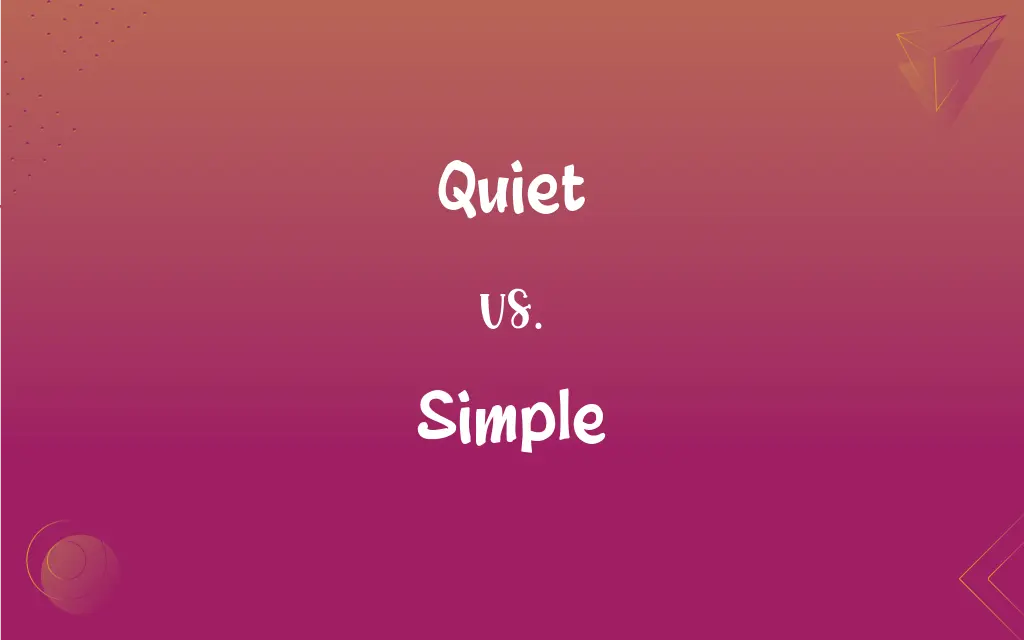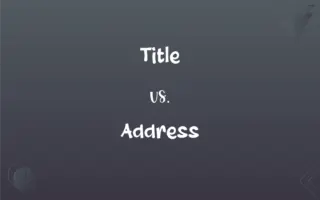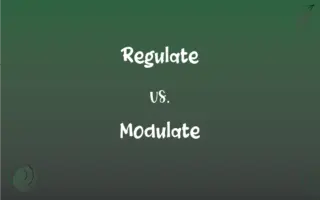Quiet vs. Simple: What's the Difference?
Edited by Aimie Carlson || By Harlon Moss || Updated on November 30, 2023
Quiet refers to a lack of noise, calmness, or silence, while simple denotes being straightforward, uncomplicated, or easy to understand.

Key Differences
Quiet often describes a state of silence or low noise, promoting peace and calmness, whereas simple pertains to something that is easy to understand or lacking in complexity.
In quiet environments, the emphasis is on the absence of loud sounds or disturbances, facilitating concentration and relaxation, while in simple scenarios, the focus is on the minimalistic or straightforward nature of things, be it design, concepts, or procedures.
Quiet is frequently sought in settings like libraries or meditation spaces to encourage a serene atmosphere, contrasting with simple, which is often preferred in contexts like instructions or designs for clarity and ease of use.
The attribute of being quiet can apply to people, places, or situations, suggesting a subdued or restrained nature, while simplicity can be attributed to objects, ideas, or methods, indicating an uncomplicated and accessible quality.
Quietness is often a desirable quality in environments where focus and tranquility are needed, whereas simplicity is valued in scenarios where straightforwardness and understandability are crucial.
ADVERTISEMENT
Comparison Chart
Definition
Lacking noise, silent, or calm.
Straightforward, uncomplicated, easy to understand.
Associated Contexts
Libraries, meditation, peaceful settings.
Instructions, designs, concepts.
Desirable Qualities
Tranquility, lack of disturbances, serenity.
Clarity, ease of use, minimalism.
Application
Applied to people, places, situations.
Applied to objects, ideas, methods.
Goal
To provide a peaceful, undisturbed environment.
To facilitate understanding and accessibility.
ADVERTISEMENT
Quiet and Simple Definitions
Quiet
Characterized by little activity or excitement.
The town had a quiet charm.
Simple
Composed of a single element; not compound.
The recipe called for simple ingredients.
Quiet
Speaking very softly or not at all.
He spoke in a quiet voice during the meeting.
Simple
Not elaborate or artificial; straightforward.
She gave a simple explanation.
Quiet
Free from disturbance or tumult; tranquil.
The library was a quiet place for study.
Simple
Lacking in sophistication or worldliness.
Their simple way of life was admirable.
Quiet
Free from noise or causing little or no noise.
She enjoyed the quiet countryside.
Simple
Plain, basic, or uncomplicated in form or design.
The room had a simple elegance.
Quiet
Not expressed loudly or openly.
Her quiet support was crucial for the team.
Simple
Easily understood or done; presenting no difficulty.
He preferred simple instructions.
Quiet
Making or characterized by little or no noise
A quiet library.
A quiet street.
A quiet, well tuned engine.
Simple
Having few parts or features; not complicated or elaborate
A house with a simple floor plan.
FAQs
Is quiet always a positive trait?
While often seen positively, quietness can be negative if it suggests isolation or lack of communication.
Can a place be both quiet and simple?
Yes, a place can be both quiet (peaceful) and simple (uncomplicated).
Can something be simple but not easy?
Yes, something can be simple (uncomplicated) but still require effort or skill to execute.
Are quiet people always introverted?
Not necessarily; quietness is a behavior, not a personality trait, and can be exhibited by anyone.
Can noise reduction make a place quiet?
Yes, reducing noise can contribute to making a place quiet.
Does simple mean boring?
No, simple means uncomplicated; it doesn't necessarily imply a lack of interest or excitement.
Do quiet people prefer solitude?
While some quiet people might prefer solitude, others enjoy social interactions in calm environments.
Can a quiet person be effective in leadership?
Yes, quiet individuals can be effective leaders with their thoughtful and calm approach.
Can simple solutions solve complex problems?
Sometimes simple solutions can effectively solve complex problems, but not always.
Can something be complex yet simple to use?
Yes, complex systems or products can be designed to be simple and user-friendly.
Is it good for a workplace to be quiet?
A quiet workplace can be beneficial for concentration and productivity, but it depends on the nature of the work.
Does simplicity equate to lack of creativity?
No, simplicity and creativity are not mutually exclusive; simple designs can be highly creative.
Can quietness help in learning?
Quiet environments can enhance focus and facilitate learning.
Are simple things always less valuable?
Value is subjective; simple things can be highly valuable depending on context and perspective.
Is simplicity in design always preferred?
Preference for simplicity varies; it is often desired for clarity and usability, but not always.
Does a simple lifestyle mean avoiding technology?
Not necessarily; a simple lifestyle focuses on minimalism and essentials, not necessarily avoiding technology.
Can a busy place be quiet?
A busy place can have moments of quiet, but it generally has more noise and activity.
Is being quiet a sign of weakness?
Being quiet is not inherently a sign of weakness; it can indicate thoughtfulness or contemplation.
Is simple food always healthy?
Simple food can be healthy, but it depends on the ingredients and preparation methods.
Does quiet always mean silence?
Quiet often implies low noise levels, but not complete silence.
About Author
Written by
Harlon MossHarlon is a seasoned quality moderator and accomplished content writer for Difference Wiki. An alumnus of the prestigious University of California, he earned his degree in Computer Science. Leveraging his academic background, Harlon brings a meticulous and informed perspective to his work, ensuring content accuracy and excellence.
Edited by
Aimie CarlsonAimie Carlson, holding a master's degree in English literature, is a fervent English language enthusiast. She lends her writing talents to Difference Wiki, a prominent website that specializes in comparisons, offering readers insightful analyses that both captivate and inform.































































